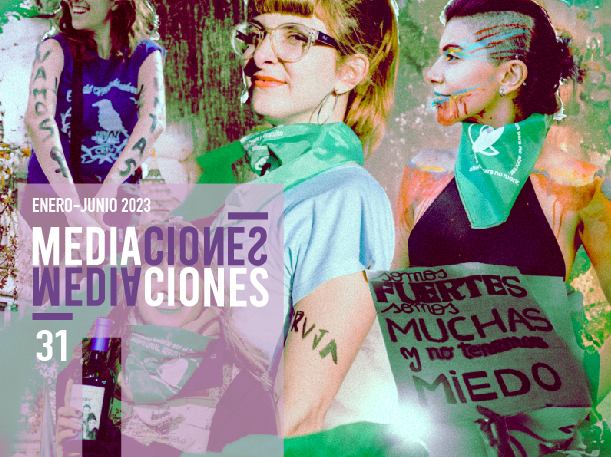Teologías Feministas y Movimientos de Mujeres en Argentina: aportes para pensar la construcción del poder popular
Contenido principal del artículo
Resumen
Las reflexiones sobre el poder representan una demanda de la hora para los pueblos de América Latina. Si bien siempre estuvieron presentes en la academia y en los movimientos sociales, las categorías de comprensión acerca del poder han sido múltiples y en disputa: desde el entendimiento del poder como un valor negativo, hasta la relativización de las estructuras hegemónicas y la desaparición del sujeto como agente social. Es en este marco histórico, político y social que resulta indispensable, desde el campo de los estudios en comunicación, volver a conceptualizar el poder desde una mirada popular; para comprender los procesos sociales y culturales presentes en los países “periféricos” de cara a los bloques hegemónicos mundiales, que representan una verdadera amenaza a los procesos de emancipación y soberanía. Recuperar las discusiones acerca del poder y de los sujetos, plantea la necesidad de encontrar claves que nos permitan generar articulación y unidad en los movimientos populares, así como generar transformaciones políticas de bases más sólidas. En este sentido, los movimientos de mujeres presentan hoy el desafío de consolidarse como un muro de contención de los proyectos neofascistas, rompiendo con visiones conservadoras del orden social y con discursos del “sálvese quien pueda”, para dar paso a una otra forma de relación-vincular que permita trazar puentes de comprensión y sororidad con el padecimiento de la otredad. El presente trabajo intenta recuperar reflexiones y prácticas dentro de los movimientos de mujeres en Argentina a fin de evaluar las propuestas de construcción de poder popular que representa su accionar en el espacio público, dentro y fuera de las organizaciones políticas tradicionales. Asimismo, esta reflexión incorpora la articulación de dichos movimientos con la Teología Feminista Latinoamericana, bajo la hipótesis de que la propuesta ética de dichas religiosas se articula con las prácticas de transformación del orden social que proponen los movimientos de mujeres, femineidades y diversidades en la órbita nacional.
Detalles del artículo
Sección

Esta obra está bajo una licencia internacional Creative Commons Atribución 4.0.
![]()
Revista MEDIACIONES © 2024 por Corporación Universitaria Minuto de Dios - UNIMINUTO está licenciada bajo Creative Commons BY.
Cómo citar
Referencias
Austin, J. L. (1990) ¿Cómo hacer cosas con palabras? Palabras y Acciones. Paidós.
Agamben, G. (2018). El uso de los cuerpos. Homo Sacer, IV, 2. Pre-Textos.
Beck, U. (1998). La sociedad del riesgo: hacia una nueva modernidad. Barcelona: Paidós ibérica.
Bourdieu, P. y Wacquant, L. (1995). Respuestas. Por una antropología reflexiva. Griajlbo.
Bourdieu, P. (1997). Razones prácticas. Sobre la teoría de la acción. Anagrama.
Bourdieu, P. (2000). Poder, derecho y clases sociales. Desclée de Brouwer.
Butler, J. (2002). Cuerpos que importan. Sobre los límites materiales y discursivos del “sexo”. Paidós.
Dri, R. (2001, Junio 18). La construcción del poder popular. Revista Koeyu Latinoamericano. Archivo Chile. Disponble en: http://www.archivochile.com/Debate/debate_izq_latina/debatizqlatina0003.pdf
Dri, R. (2008). Movimientos Sociales. La emergencia del nuevo espíritu. Buenos Aires, Editorial Nuevos Tiempos.
Dri, R. (2011). De la multitud al pueblo, del no poder al poder popular. Revista Herramienta(N° 46).
Dri, R. (2018). Clases proporcionadas en el marco del Seminario de Posgrado “La construcción de poder popular” dictado por Rubén Dri y Antonio Fenoy en 2018, para el doctorado en Comunicación de la Facultad de Periodismo y Comunicación Social de la Universidad Nacional de La Plata (inédito).
Femenías, M. L. (2012) 2ed. Sobre sujeto y género. (Re) lecturas feministas desde Beauvoir a Butler. Prohistoria ediciones.
Foucault, M. (2007 [1970]). La arqueología del saber. Siglo XXI.
García, M. (2016). La ética cristiana, una experiencia de la diversidad. Entrevista con la teóloga feminista brasileña Ivone Gebara. Revista Con X. Ediciones de Periodismo y Comunicación. Disponible en: https://perio.unlp.edu.ar/ojs/index.php/conequis/article/view/CXe014/3052
Gebara, I. (2002). El rostro oculto del mal: una teología desde la experiencia de las mujeres. Trotta.
Gebara, I. (2014). Filosofía feminista: brevísima introducción. Doble clic.
Gramsci, A. (1975). Cartas desde la Cárcel. Cuadernos para el Diálogo.
Huergo, J. (2002). Hegemonía: un concepto clave para comprender la comunicación. Facultad de Periodismo y Comunicación Social – UNLP [Internet]. [citado 25 jul 2019]. Disponible en: https://perio.unlp.edu.ar/sitios/opinionpublica2pd/wp-content/uploads/sites/14/2015/09/P2.1-Ficha-de-c%C3%A1tedra.-Huergo.pdf
Laclau, E. y Mouffe, C. (2010). Hegemonía y estrategia socialista: hacia una radicalización de la democracia. Fondo de Cultura Económica.
Pateman, C. (1995). El Contrato sexual. Anthropos.
Perry, C. L. y Jessor, R. (1985). The concept of health promotion and the prevention of adolescent drug abuse. Health education quarterly, 12(2)169-184. Inglaterra: Health EDCO.
Rabinow, H. y Dreyfus, P. (2001). Michael Focault. Más allá del estructuralismo y la hermenéutica. Nueva Visión.





